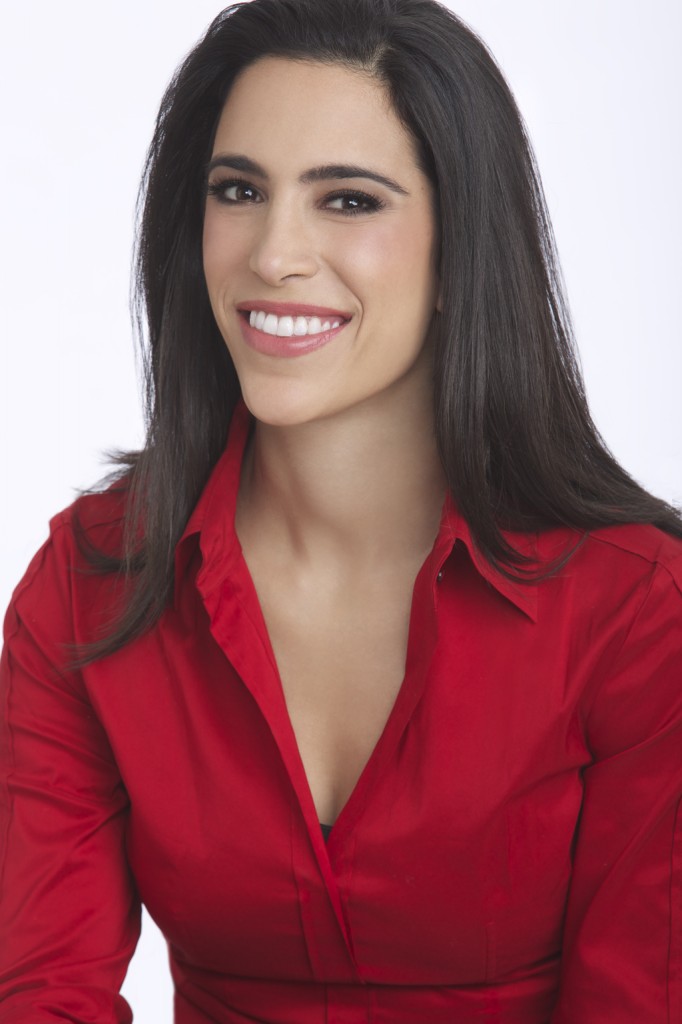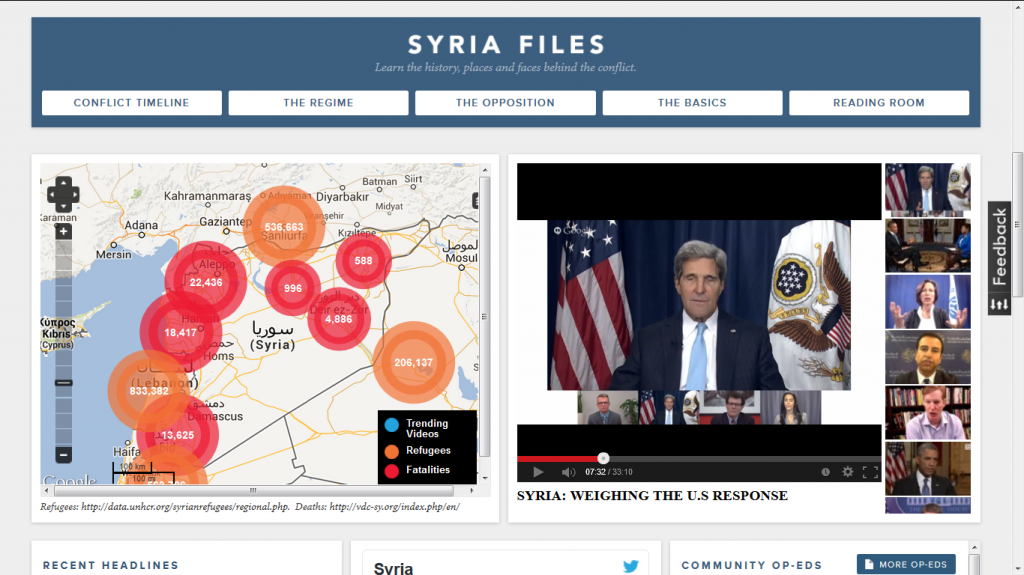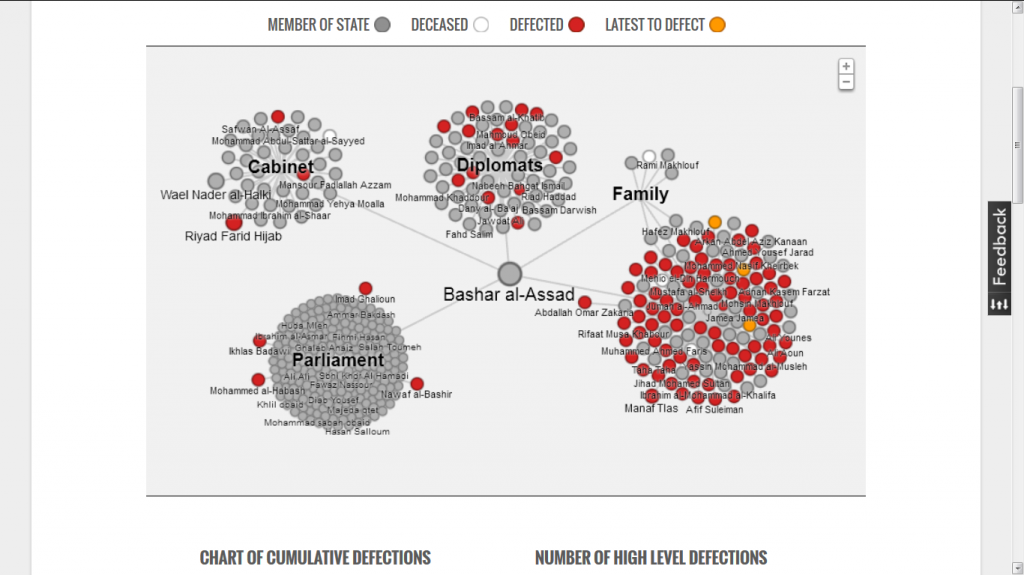People who innovate: Syria Deeply founder Lara Setrakian
 Seasoned reporter Lara Setrakian quit a coverted job as a Middle East correspondent to co-found the online news site, Syria Deeply. The portal is dedicated to a single topic – the conflict in Syria – and has an innovative approach to news gathering. It serves as a landing page for pertinent news on the conflict, combining original reporting from the field with aggregated material. It also includes a plethora of digital storytelling tools from interactive maps and timelines to SoundCloud commentary and tweets.
Seasoned reporter Lara Setrakian quit a coverted job as a Middle East correspondent to co-found the online news site, Syria Deeply. The portal is dedicated to a single topic – the conflict in Syria – and has an innovative approach to news gathering. It serves as a landing page for pertinent news on the conflict, combining original reporting from the field with aggregated material. It also includes a plethora of digital storytelling tools from interactive maps and timelines to SoundCloud commentary and tweets.
Setrakian left her cushy TV job (her words) with Bloomberg and ABC News because she felt the mainstream media coverage of the Syria crisis was difficult to follow with chaotic storylines instead of thorough reporting on the war and its humanitarian consequences.
In an interview with onMedia’s Jannis Hagmann, Setrakian talks about how she wants to fuse traditional journalism with startup culture and reform the coverage of global crises.
Lara, three years after the uprising started in Syria, what is your take on media coverage of the crisis?
Certain news organizations have been doing an incredibly thorough job covering the situation. AFP, Reuters or even the Wall Street Journal have had multiple reporters on the ground. Still, I feel the overall user experience of the Syria crisis is terrible. It is very difficult to follow and to understand the context.
In December 2012, you launched the single-story website, Syria Deeply. How is it different to traditional news sites?
We have a combination of social media monitoring, news aggregation, select curation and data visualization. Our most important consideration was user-centricity: how do we put users at the center and how do they capture as much information as possible?

Why do you need a single-topic platform for that? Why focus just on Syria?
We need more space and flexibility than traditional news platforms can provide. We have a lot of stories about what some would consider boring everyday life. But the truth is, everyday life is very important. We want to explain the broader dynamics of what’s going on through a snapshot of everyday life. There is not much attention being paid to what’s happening inside Syria. As soon as it became difficult to access the story inside the country, the internal dynamics basically disappeared and only coverage of the diplomatic front and other easier-to-reach aspects were available.
You have a video box and a Twitter feed on your site but also reports from your staffers in Syria. How do you tackle the problem of being denied access to the country?
We find individuals in Syria who would have been our fixers but train them to write for us and empower them to tell their own stories in a professional way. These are people who write in Arabic. Therefore we wouldn’t usually hear from them. But investing the energy in training and engaging them and then translating their work gives us access to a whole new realm of storytelling.
How many people work on Syria Deeply?
We have six full-time staffers and 14 Syrians working in various capacities. We hope we can make more of these people full-time. Western journalists tend to treat locals as assistants. Locals generally don’t get the credits, the training or the capacity building. But we want these journalists to thrive so that one day, when we all move on to the next story, they still have the skills to perpetuate an independent media.
But for now, the Syrians who work for you are freelancers?
They are freelance but write quite often. They send us stories and we often go back and forth several times and ask for more specifics. We do our utmost to make sure that they know what it means to file a piece as a journalist – not as an activist or revolutionary but as a journalist.
What measures do you take to protect your correspondents in the field?
We use pseudonyms for all of our reporters and we don’t show people’s faces. We do our utmost to protect identities and are very cautious of cybersecurity issues. We’ve also engaged with partners like the Committee to Protect Journalists to implement some of the best practices they recommend.

What is the most important lesson you have learned creating your own media project?
There is a great power in consistency. When you are consistent with something, there will be many boosts along the way. People will come to you, you’ll become magnetic, you’ll become an address for sources and resources. I’ve also learned a great deal about how to fuse journalistic culture with startup culture. The ability to approach the type of journalism we do with a certain kind of project management has given us an absolutely power-packed approach.
Does that mean that being an entrepreneur is among the required skills of journalists in the Digital Age?
Journalists have to be much more creative and resourceful. They have to think about all the different ways their work can manifest, all the different sources that can input into their story. Journalists need to be aware of what they are delivering to the end user. They have to think more like startups.
What plans do you have for the future?
I’m extremely dedicated to whatever it takes to figure this out and to get this right. I’m personally extremely dedicated to Syria, I plan to stay dedicated to Syria until we finalize a sustainable model for excellent news coverage but I am very passionate about what we can do beyond this – extending the model to other sorts of issues such Arctic Deeply, Ocean’s Deeply or Alzheimer’s Deeply.
A first-generation Armenian-American (her partents fled the civil war in Lebanon), Setrakian’s first foreign posting was to Iran and her use of social media in covering that country’s 2009 election protests was widely acclaimed. She worked as a foreign correspondent for more than five years, covering the Middle East for television, radio, and digital platforms. Speaking with onMedia, Setrakian says she sees giving up her televsion career for the uncertain world of digital journalism as an opportunity to facilitate human understanding of a complex issue. “It’s more important to me than being on television,” she says “than any byline because I do believe that journalism is in the global pulic interest.”
Syria Deeply is currently financed through foundation grants plus has some independent revenue sources from using their technological skills to build websites for others.
Interview by Jannis Hagmann, edited by Kate Hairsine



